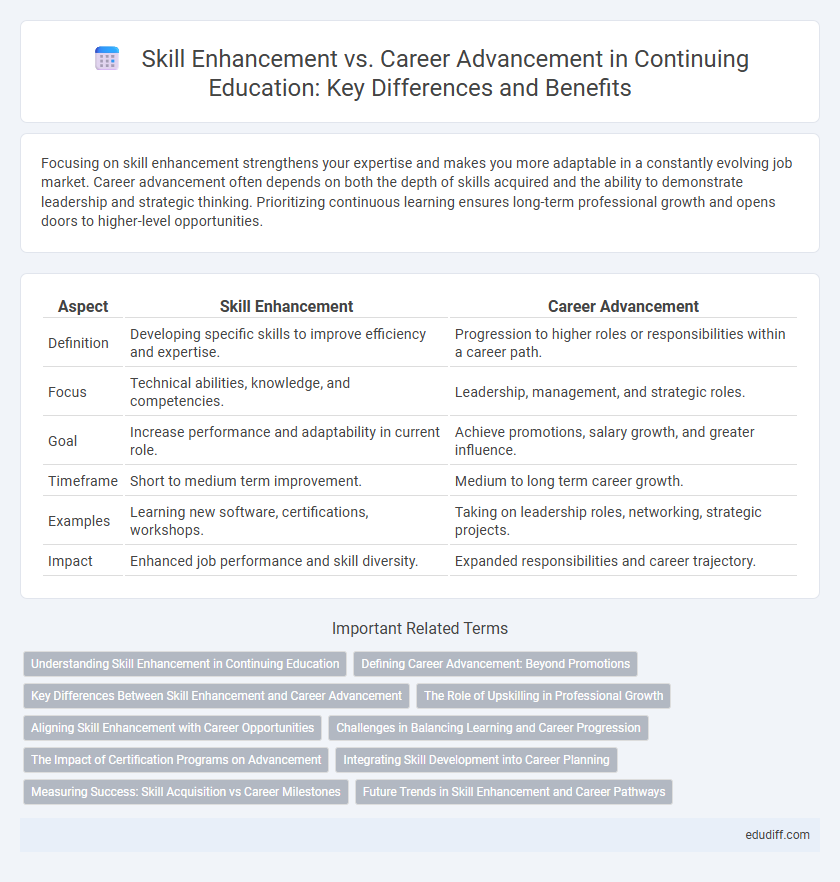Focusing on skill enhancement strengthens your expertise and makes you more adaptable in a constantly evolving job market. Career advancement often depends on both the depth of skills acquired and the ability to demonstrate leadership and strategic thinking. Prioritizing continuous learning ensures long-term professional growth and opens doors to higher-level opportunities.
Table of Comparison
| Aspect | Skill Enhancement | Career Advancement |
|---|---|---|
| Definition | Developing specific skills to improve efficiency and expertise. | Progression to higher roles or responsibilities within a career path. |
| Focus | Technical abilities, knowledge, and competencies. | Leadership, management, and strategic roles. |
| Goal | Increase performance and adaptability in current role. | Achieve promotions, salary growth, and greater influence. |
| Timeframe | Short to medium term improvement. | Medium to long term career growth. |
| Examples | Learning new software, certifications, workshops. | Taking on leadership roles, networking, strategic projects. |
| Impact | Enhanced job performance and skill diversity. | Expanded responsibilities and career trajectory. |
Understanding Skill Enhancement in Continuing Education
Skill enhancement in continuing education focuses on developing specific competencies and expertise to improve job performance and adaptability in evolving industries. This targeted learning approach equips professionals with up-to-date technical skills, practical knowledge, and innovative methodologies essential for maintaining relevance in competitive job markets. Emphasizing skill enhancement fosters lifelong learning, enabling individuals to meet current workplace demands and prepare for future career opportunities effectively.
Defining Career Advancement: Beyond Promotions
Career advancement transcends mere promotions by encompassing expanded responsibilities, skill acquisition, and increased influence within an organization. It involves strategic career growth through networking, leadership development, and continuous learning that aligns with long-term professional goals. Effective career advancement reflects a proactive approach to positioning oneself for future opportunities and higher-value roles.
Key Differences Between Skill Enhancement and Career Advancement
Skill enhancement involves acquiring new abilities and improving existing competencies to increase job performance and adaptability. Career advancement encompasses promotions, increased responsibilities, and higher-status roles within an organizational hierarchy. Key differences include skill enhancement being primarily skill-focused and ongoing, while career advancement reflects tangible progression in position and professional status.
The Role of Upskilling in Professional Growth
Upskilling plays a critical role in professional growth by bridging the gap between current competencies and industry demands, enhancing skill enhancement and paving the way for career advancement. Continuous learning through targeted training programs and certifications equips professionals with cutting-edge expertise that increases employability and opens opportunities for higher-level positions. Organizations investing in employee upskilling benefit from a more agile workforce capable of adapting to technological changes and driving innovation.
Aligning Skill Enhancement with Career Opportunities
Aligning skill enhancement with career opportunities ensures targeted growth that meets industry demand and employer expectations. Prioritizing in-demand skills such as digital literacy, data analysis, and leadership increases employability and opens pathways for promotions and new roles. Continuous skills development tailored to career goals drives professional advancement and long-term job security.
Challenges in Balancing Learning and Career Progression
Balancing skill enhancement with career advancement presents challenges such as time constraints, where professionals must allocate limited hours between acquiring new competencies and fulfilling job responsibilities. Navigating organizational expectations often complicates prioritizing learning opportunities without compromising performance metrics. Furthermore, rapid industry changes require continuous upskilling, demanding effective strategies to integrate development seamlessly within career progression paths.
The Impact of Certification Programs on Advancement
Certification programs significantly boost career advancement by validating specialized skills and knowledge, making professionals more competitive in the job market. Employers often prioritize certified candidates for promotions and leadership roles, recognizing their commitment to continuous learning and expertise. Data from industry reports indicate that certified individuals experience up to a 15% higher salary increase and faster progression compared to non-certified peers.
Integrating Skill Development into Career Planning
Integrating skill development into career planning ensures continuous growth and adaptability in dynamic job markets. Focusing on acquiring relevant skills aligned with long-term career goals enhances employability and opens pathways for promotion. Regular assessment of skill gaps combined with targeted training programs accelerates career advancement and professional success.
Measuring Success: Skill Acquisition vs Career Milestones
Skill acquisition is measured by the depth and breadth of competencies gained, often evaluated through certifications, project outcomes, and proficiency assessments. Career milestones are quantified by promotions, salary increments, and leadership roles, reflecting increased responsibility and industry recognition. Both metrics provide complementary insights, with skill enhancement driving long-term career advancement through sustained expertise development.
Future Trends in Skill Enhancement and Career Pathways
Rapid advancements in artificial intelligence and automation are reshaping future skill enhancement priorities, emphasizing digital literacy, emotional intelligence, and adaptive learning abilities. Career pathways increasingly favor interdisciplinary expertise and continuous upskilling through micro-credentials and online platforms like Coursera and LinkedIn Learning. Organizations adopting predictive analytics for workforce planning create dynamic career advancement opportunities aligned with emerging industry demands.
Skill Enhancement vs Career Advancement Infographic

 edudiff.com
edudiff.com